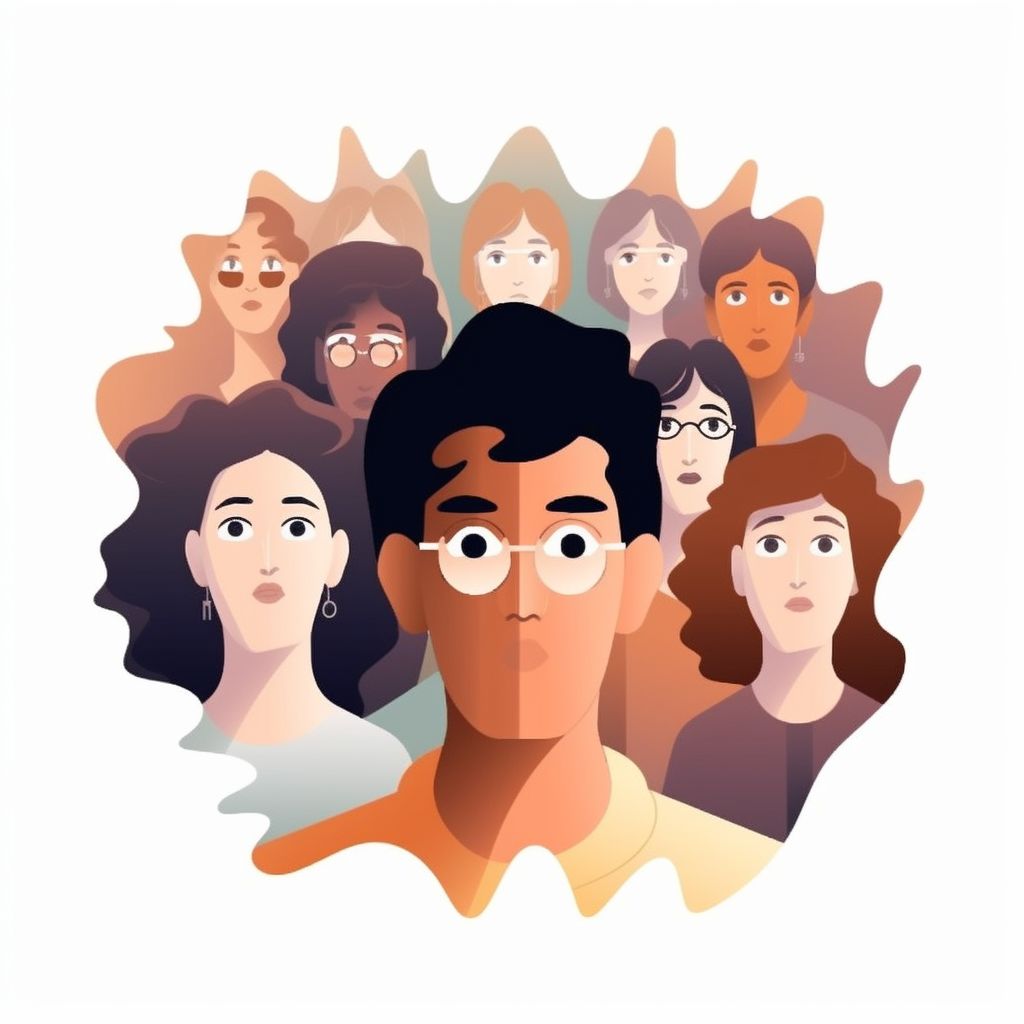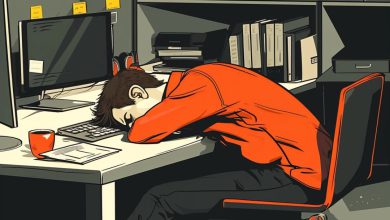Social Anxiety & MBTI: How Each Type Faces the Fear

You might be familiar with the Myers-Briggs Type Indicator (MBTI) as a tool that helps us understand our personalities.
But have you ever wondered if your unique personality type could be connected to your likelihood of experiencing social anxiety?
In this article, we’ll take a closer look at this intriguing intersection.
We’ll explore which MBTI type is most likely to have social anxiety, discuss the traits that might contribute to social anxiety and MBTI types connection, and dive into the complex factors that shape an individual’s experience of social anxiety.
What is Social Anxiety?
Social anxiety, also known as social phobia, is an intense fear of social situations, often stemming from a fear of judgment or scrutiny. It can manifest as excessive self-consciousness, nervousness, and avoidance of social interactions.
Social anxiety can significantly affect an individual’s daily life. It may lead to avoidance of social gatherings, difficulty in making friends, and hindered professional growth. The emotional toll can result in feelings of isolation and low self-esteem.
| Read more: The Relationship between MBTI and Mental Illness
Is There a Connection Between MBTI Types and Social Anxiety?

While it’s important to reiterate that the Myers-Briggs Type Indicator (MBTI) is not a scientifically validated tool for assessing mental health issues like social anxiety, some individuals have explored potential connections between MBTI personality types and social anxiety. Keep in mind that these connections are general observations and not definitive:
1. Introversion Preference
Introverted personality types (e.g., INTP, INFJ) may be more likely to experience social anxiety. Introverts may find social interactions draining, which can contribute to social anxiety in certain situations.
2. Sensing vs. Intuition
Sensing types (e.g., ISTJ, ISFP) may feel more comfortable in concrete, structured social situations, while intuitive types (e.g., INFP, ENTP) might struggle in unpredictable or ambiguous social settings.
3. Thinking vs. Feeling
Thinking types (e.g., INTJ, ISTP) may be more focused on logic and analysis, possibly leading to overthinking in social situations. Feeling types (e.g., ENFJ, ISFJ) may be more concerned about emotional aspects of social interactions, which could contribute to anxiety.
4. Judging vs. Perceiving
Judging types (e.g., ESTJ, ENTJ) may set high standards for their social performance, potentially increasing anxiety when they fear falling short. Perceiving types (e.g., INFP, ENFP) might struggle with the uncertainty of social interactions, leading to anxiety.
| Discover: MBTI and Anxiety | Personalities More Prone to Stress
Myers Briggs Personalities and Social Anxiety Symptoms
Here’s a brief overview of how each MBTI type may experience specific symptoms of social anxiety:
| MBTI Type | Social Anxiety Symptoms |
| ISTJ | Excessive self-criticism, fear of making mistakes in public, avoidance of uncertainty. |
| ISFJ | People-pleasing, fear of conflict, strong desire to be liked by others. |
| INFJ | Feeling overwhelmed in social gatherings, overthinking social interactions, fear of not connecting on a deep level. |
| INTJ | Feeling misunderstood or not fitting in, social isolation. |
| ISTP | Avoiding emotional discussions, discomfort with excessive attention, preference for practical activities. |
| ISFP | Being reserved, avoidance of confrontation, fear of rejection from loved ones. |
| INFP | Difficulty initiating conversations, fear of criticism, internalizing negative feedback. |
| INTP | Overanalyzing social interactions, preference for solitary activities, discomfort in group discussions. |
| ESTP | Impulsivity, avoidance of deep emotional conversations, seeking stimulation for coping. |
| ESFP | Fear of judgment, seeking external validation, discomfort as the center of attention. |
| ENFP | Overthinking interactions, fear of missing out, feeling overwhelmed in social situations. |
| ENTP | Tendency to debate excessively, struggling to focus on one topic, discomfort in structured environments. |
| ESTJ | Self-criticism, fear of public speaking, discomfort in unstructured or spontaneous situations. |
| ESFJ | People-pleasing, difficulty in saying no, fear of being perceived as selfish. |
| ENFJ | Perfectionism, excessive worry about others’ well-being, fear of rejection and stress in social situations. |
| ENTJ | Fear of incompetence, impatience with inefficiency, avoidance of situations not aligned with goals. |
Please note that these are general tendencies and not definitive for every individual of a specific MBTI type. Social anxiety can manifest differently in each person, and these descriptions provide a broad overview of potential behaviors associated with each type.
Which MBTI Has Social Anxiety the Most?
Individuals of any MBTI type can experience social anxiety, and it’s influenced by various factors beyond personality preferences.
But some of the personalities may be more prone to experience social anxiety as listed below:
| Discover: MBTI Addiction | Who is Most at Risk?
| MBTI Type | Reason for Social Anxiety |
| INFP | Introverted, sensitive, and emotionally focused |
| INFJ | Self-aware, empathetic, and perfectionistic |
| ISFJ | Conscientious, eager to please, and rule-following |
| ISTJ | Detail-oriented, perfectionistic, and introverted |
| INTJ | Analytical, introspective, and high standards |
| INTP | Analytical, introverted, and prone to overthinking |
| ISFP | Sensitive to criticism, values individuality |
| Introverted | Find social interactions draining and tiring |
| Judging Types (e.g., INTJ, ISTJ) | High standards and self-criticism |
| Feeling Types (e.g., INFP, INFJ) | Emotional focus and relationship concerns |
Many students experience social anxiety when they are new at collage or university.
If you or someone you care about are in this situation, we recommend reading our comprehensive guide: “Anxiety at College: Strategies to Handle Social Anxiety for Students”
Tips for MBTI Types with Social Anxiety

Dealing with social anxiety can be challenging, but tailored strategies can be effective.
Here are tips for managing social anxiety for each of the MBTI personality types mentioned, as well as a general tip for other types:
For INFPs:
- Practice self-compassion and self-acceptance to manage self-criticism.
- Engage in exposure therapy by gradually exposing yourself to social situations.
For INFJs:
- Challenge perfectionism and focus on progress, not flawlessness.
- Use visualization techniques to prepare for social interactions and reduce anxiety.
For ISFJs:
- Set realistic boundaries to avoid overextending yourself in social situations.
- Develop a social support system to lean on when feeling anxious.
| Read the full guide: ISFJ Social Anxiety
For ISTJs:
- Create a structured plan for social interactions to reduce uncertainty.
- Focus on the positive outcomes of socializing, like building connections.
For INTJs:
- Develop a mental script or talking points to feel more prepared in social situations.
- Remind yourself that it’s okay not to have all the answers.
For INTPs:
- Challenge overthinking by setting time limits on social analysis.
- Use humor and curiosity to approach social situations with a more relaxed mindset.
For ISFPs:
- Work on assertiveness skills to express your needs and boundaries.
- Practice mindfulness techniques to stay present in social interactions.
For Introverted Types (e.g., INFJ, ISTJ):
- Find a balance between social interactions and alone time to recharge.
- Gradually expose yourself to social situations to build tolerance.
For Judging Types (e.g., INTJ, ISTJ):
- Embrace flexibility and adaptability in social situations.
- Shift your focus from avoiding mistakes to learning from them.
For Feeling Types (e.g., INFP, INFJ):
- Challenge negative self-talk by emphasizing your strengths.
- Practice assertiveness to communicate your feelings and needs.
General Tip (for other types):
- Develop social skills by seeking opportunities for social interaction.
- Use relaxation techniques like deep breathing or mindfulness to manage anxiety.
- Seek professional help from a therapist or counselor who specializes in treating social anxiety.
Learn more…
HealWiser’s Last Piece of Advice
Seek professional help if social anxiety significantly impacts your life.
Through therapy, you can develop tailored strategies to manage social anxiety in MBTI types, build confidence, and enjoy more fulfilling social interactions.
Remember, personal growth and change are possible with the right support and effort.
Sharing your experiences can provide valuable insights and emotional support. So…
…share your story with HealWiser and others in the comments section below this post.






